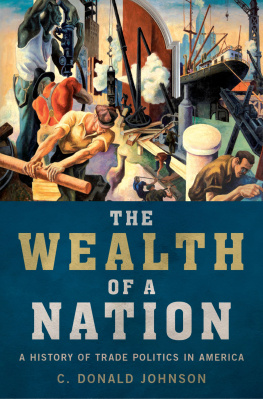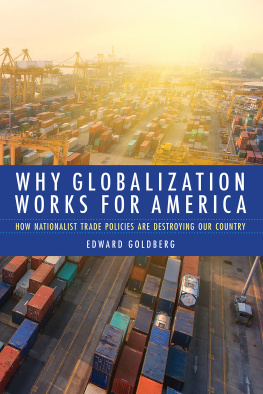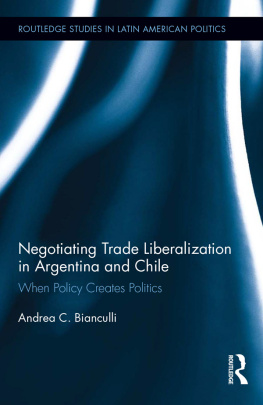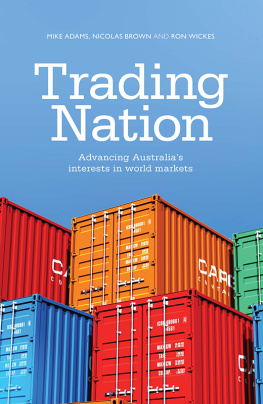The Wealth of a Nation

Oxford University Press is a department of the University of Oxford. It furthers the Universitys objective of excellence in research, scholarship, and education by publishing worldwide. Oxford is a registered trade mark of Oxford University Press in the UK and certain other countries.
Published in the United States of America by Oxford University Press
198 Madison Avenue, New York, NY 10016, United States of America.
Oxford University Press 2018
All rights reserved. No part of this publication may be reproduced, stored in a retrieval system, or transmitted, in any form or by any means, without the prior permission in writing of Oxford University Press, or as expressly permitted by law, by license, or under terms agreed with the appropriate reproduction rights organization. Inquiries concerning reproduction outside the scope of the above should be sent to the Rights Department, Oxford University Press, at the address above.
You must not circulate this work in any other form and you must impose this same condition on any acquirer.
Library of Congress Cataloging-in-Publication Data
Names: Johnson, Don, 1948 author.
Title: The wealth of a nation : a history of trade politics in America / C. Donald Johnson.
Description: New York, NY : Oxford University Press, [2018] | Includes bibliographical references.
Identifiers: LCCN 2017033348 | ISBN 9780190865917 (hardcover) | ISBN 9780190865931 (epub)
Subjects: LCSH: Free tradeUnited StatesHistory. | United StatesCommercial policyHistory. | United StatesCommerceHistory. | United StatesEconomic policy.
Classification: LCC HF1753 .J64 2018 | DDC 382/.710973dc23 LC record available at https://lccn.loc.gov/2017033348
To Suzanne Spratlin Johnson, Anna Johnson Barnett, and the memory of Eugenia Hailey Johnson
the strong, loving, wise, and stabilizing women in my life.
Contents
As the seasons change from summer to fall from the vantage point of my office on our family farm in rural north Georgia, I am struck by the tumult and turbulence the world is facing in the early months of the Trump era. In this particular settingin an old house that has seen so many seasons of American history since before the Civil War, surrounded by old trees outside and even older books insideand at this particular momentwith the liberal geopolitical and economic institutions created to avoid another Depression and the world wars of the twentieth century facing perhaps the greatest existential threats since they were createdI review the final edits of the manuscript for this book taking the long view of the politics of trade in America.
Centuries before President Donald Trump withdrew from the Trans Pacific Partnership and other international leadership roles, while promising to build a big, beautiful wallindeed, centuries before Adam Smith wrote the seminal treatise that is the foundational reference for this bookthere was another great global power that chose to withdraw from engagement with the world and its markets and to retire behind a Great Wall.
Since I began traveling to East Asia as a trade negotiator in the late 1990s and began reading Chinese history, one of the more fascinating periods that I have come acrossa period that has particular relevance to the politics of trade todaytakes place during the reign of Zhu Di, who became Yongle, the third emperor of the Ming Dynasty, in 1402. Zhu Di moved the capital to Beijing from Nanjing and expanded the sphere of Chinese culture and influence far beyond its territories. He repaired and reopened the 2,000-mile Grand Canal to transport grain from the fertile Yangtze River valley in the south to Beijing and built majestic monuments known to most tourists visiting China today, including the imperial palace of the Forbidden City and the Temple of Heaven, and he established the Ming Tombs with his own. Zhu Di personally led five successful military campaigns north of the Great Wall against the Mongols, who had ruled China for the century preceding Ming rule under the Yuan Dynasty beginning under Kublai Khan. Zhu Di fought the Mongols his entire life as they continued to be the greatest threat to Ming rule. Although Zhu Dis tactics were often ruthless, his reign is considered one of the most brilliant in Chinese history.
One of the premier achievements of the reign of emperor Yongle was the expansion of the Ming naval fleet under the admiral Zheng He and the historic maritime empire created through Zhengs expeditions. Zheng He was the son of a devout Muslim of Mongol extraction who fought with Mongol rebels against the Ming army and was killed in battle. The Ming soldiers captured the ten-year-old Zheng, castrated him, and gave him as a servant to Zhu Di, a prince and prominent young army officer at the time. Though during the reigns of Zhu Dis predecessors, eunuchs were not trusted with political or significant administrative assignments, Zheng became a valued adviser and confidant to Zhu Di throughout his military campaigns, including the rebellion Zhu Di led to take the throne from his nephew not long after the death of Zhu Dis father, emperor Hong Wu. Shortly after becoming emperor, Zhu Di placed Zheng in charge of his naval fleet.
Chinese vessels and sea charts had led the world for several centuries, but Zheng He expanded the capacity and reach of Chinas navy exponentially. His lead ships, called treasure ships, were estimated to be between 400 and 600 feet long and over 150 feet wide (at least five times the size of the vessels sailed by Christopher Columbus ninety years later). Each of these ships, which numbered more than sixty on the first voyage with nine masts and twelve sails, carried at least 500 sailors and treasures of Chinese porcelain, silk goods, iron implements, and silver coins. The entire fleet of over 300 assorted ships carried horses, weaponry, grain, and a crew of around 28,000 men. From 1405 to 1433, Zheng led seven voyages, lasting two years each, to more than thirty countries throughout Asia, the Middle East, and Africa. His plan under Zhu Dis direction was to chart the entire world, carrying thousands of tons of treasure and a military force to promote the power and influence of the Ming dynasty and build a great empire through gifts, trade, and foreign domination. Using his military and diplomatic skills, Zheng founded numerous colonies during these voyages and brought many of the kingdoms he visited within the Chinese tribute system. Zheng spread Chinese culture and influence throughout the regions he traveled, which can be traced centuries after his expeditions ended, and temples were constructed in his honor.
After Zhu Di died in 1424 from an illness acquired during his last expedition against the Mongols, however, the imperial power and influence of the Chinese navy soon came to an end. The two succeeding emperors found Zhengs expeditions too extravagant at a time when Mongols continued to be the greatest threat to the dynasty. Unlike Zhu Di and Zheng He, they saw little value in interaction with the outside world. Zhu Dis grandson, emperor Xuande, permitted only one last voyage during which Zheng traveled to Mecca and died at sea on the return home.
From this time forward, the dynasty allowed its oceangoing vessels to deteriorate without repair and withdrew behind the Great Wall in the grand sanctity of the Middle Kingdom. The kingdom closed its ports to foreign ships, which the powers believed only carried barbarians, in xenophobic resistance to the outside world. This policy continued into the Qing dynasty and ultimately led to disastrous and humiliating consequences in the last century of the empire and beyond. The Opium Wars, the territorial concessions taken by the Western powers, and the ravaging abuses inflicted by Japanese militarism have all instilled a lasting national resentment that impacts Chinese policy to this day.











